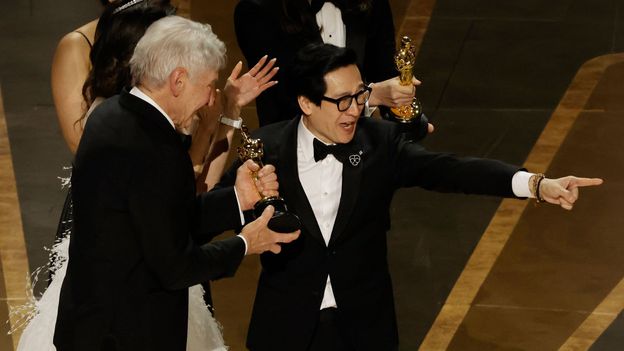
At the end of the Oscars, the ceremony’s host, Jimmy Kimmel, strode into the wings and flipped a number one on to a board that read: “Number of Oscar Telecasts Without Incident”. It was only natural that Kimmel should make so many jokes about last year’s Incident, but even if you had somehow forgotten about Will Smith slapping and swearing at Chris Rock
More like this:
– The oddball film that swept awards season
– Nine Oscars outfits once mocked now iconic
– A shocking moment in Oscar’s history
Kimmel was relaxed and in control: he even finished by mentioning that he would be back on his talk show the following night, as if to suggest that this was just another evening’s work for him. No one made any embarrassing mispronunciations or gaffes. The introductory speeches weren’t too painful, and the jokes weren’t bad. The In Memoriam round-up was touching, with a well-judged, tearful introduction by John Travolta and a piano ballad performed by Lenny Kravitz. The dresses were sparkly, and the gold and silver art-deco stage decorations evoked the glamorous hotels and ocean liners of Hollywood’s golden age. Everything lulled you into imagining that the screw-ups of the past few years were just a bad dream.
It’s true that long stretches of the three-and-a-half-hour bash were boring and repetitive, but that’s almost always the case with awards ceremonies, and there were only a couple of obvious flaws. (The practice of starting the music before recipients have finished their acceptance speeches is as infuriating and insulting as ever.) And the winners in each category seemed to have been picked according to which one would provide the most warm and cosy feelings. They all seemed to be decent human beings who were grateful for their prizes while emphasising that film-making, like life, is a team effort. None of them appeared to be at risk of being cancelled. The director of An Irish Goodbye, which won best live action short film, used his allotted time to ask the audience to sing “Happy Birthday” to the film’s star, James Martin. And nobody slapped anyone. Even if you didn’t think the best man or woman won in every category, there weren’t many results that would have had a reasonable person throwing a shoe at the TV screen and yelling, “How dare they?”
That fuzzy feeling started with wins for Jamie Lee Curtis for best supporting actress and Ke Huy Quan for best supporting actor, both for their roles in Everything Everywhere All at Once. Admittedly, Angela Bassett didn’t look too pleased that she hadn’t been given the best supporting actress prize, but Curtis is a trooper who has kept working without much recognition, so most people could hardly object to her triumph. Quan, meanwhile, gave up on acting after his childhood roles in Indiana Jones and The Temple of Doom and The Goonies, so his win was a celebration of second chances. (The emotional highlight of the ceremony came when he hugged Indiana Jones himself, Harrison Ford, when Everything Everywhere All at Once won best picture.) Another beloved star making a comeback was Brendan Fraser, who was named best actor for The Whale, after more than a decade when he was a long way off Hollywood’s A-list. It was tricky to work out what exactly his rambling speech was about, but he was clearly overwhelmed, as was everyone who had been thrilled by the “Brenaissance”. And Michelle Yeoh’s best actress prize, also for Everything Everywhere All at Once, was a celebration of her long career, a fillip to “ladies” who had been told they were “past your prime”, in her words, and a sign that Hollywood was finally ready to honour Asian and Asian-American talent. “To all the little girls and boys who look like me,” she said, “this is the beacon of hope.”
That was the central theme of the night. The big winner, with seven Oscars including best picture, best director and best original screenplay, was Everything Everywhere All at Once, a film that not only had an Asian-American co-director, Daniel Kwan, but was also all about an Asian immigrant family. (Well, that and universe-hopping supervillains, anyway.) But there was also Naatu Naatu from RRR, the first time a song from an Indian production had won the best original song Oscar: the composer, MM Keeravani, sang his acceptance speech to the tune of the Carpenters’ Top of the World. And the best documentary short film winner, The Elephant Whisperers, was Indian, too. What that meant was that while the ceremony seemed on one level to be a mellow, old-fashioned affair, with nothing much to be shocked or upset by, it was nonetheless radical in its own quiet way.
The absence of so many of Hollywood’s biggest names, Tom Cruise and James Cameron among them, hinted that the US film industry’s certainties are crumbling. The major, historic studios had to content themselves with a sound design award for Top Gun: Maverick, a visual effects award for Avatar: The Way of Water, and a costume design award for Black Panther: Wakanda Forever. It was an independent studio, A24, that was behind Everything Everywhere All at Once, a heady science-fiction martial-arts comedy that wouldn’t even have been nominated for an Oscar a decade ago. A24 was also behind The Whale. The evening’s other big winner, All Quiet on the Western Front, was a German production that was funded by Netflix, and that same streaming service bankrolled the winner of the animated feature Oscar, Guillermo del Toro’s Pinocchio. The whole evening could be read as Hollywood’s confession that it doesn’t make the best films any more – or, at least, the kind of films that win Oscars. So maybe Kimmel was wrong to joke that the telecast had passed without incident. It was a smooth, happy affair, but it was a slap in the face for Hollywood.